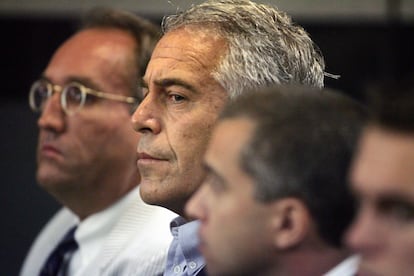Justice Department blames Jeffrey Epstein’s suicide on jail guard negligence and misconduct
Inspector General Michael Horowitz on Tuesday cited the federal Bureau of Prisons’ failure to assign Epstein a cellmate after his previous one left and problems with surveillance cameras as factors in his death

The Justice Department’s watchdog said Tuesday that a “combination of negligence and misconduct” enabled financier Jeffrey Epstein to take his own life at a federal jail in New York City while he was awaiting trial on sex trafficking charges. Inspector General Michael Horowitz cited the federal Bureau of Prisons’ failure to assign Epstein a cellmate after his previous one left and problems with surveillance cameras as factors in Epstein’s death.
Horowitz also said that Epstein was left in his cell with too many bed linens, which are a security issue and were used in his suicide. The inspector general issued a report detailing findings of his investigation into Epstein’s August 2019 death, the last of several official inquiries into the matter. He reiterated the findings of other investigations that there was no indication of foul play, rebutting conspiracy theories surrounding the high-profile death.
Horowitz echoed previous findings that some members of the jail staff involved in guarding Epstein were overworked. He identified 13 employees with poor performance and recommended charges against six workers. Only the two workers tasked with guarding Epstein were charged, avoiding jail time in a plea deal after admitting to falsifying logs.
The report comes more than four years after Epstein took his own life at the Metropolitan Correctional Center while awaiting trial on sex trafficking and conspiracy charges.
It also comes weeks after The Associated Press obtained thousands of pages of records detailing Epstein’s detention and death and its chaotic aftermath.
The workers assigned to guard Epstein were sleeping and shopping online instead of checking on him every 30 minutes as required, prosecutors said.
Nova Noel and Michael Thomas admitted lying on prison records to make it seem as though they had made the checks but avoided prison time under a deal with prosecutors. They left the Bureau of Prisons in April 2022, agency spokesperson Benjamin O’Cone said.
It’s the second time in six months that Horowitz has blamed a high-profile inmate’s death on the Bureau of Prisons’ failings. In December, the inspector general found that management failures, flawed policies and widespread incompetence were factors in notorious gangster James “Whitey” Bulger’s 2018 beating death at a troubled West Virginia prison.
The AP obtained more than 4,000 pages of documents related to Epstein’s death from the federal Bureau of Prisons under the Freedom of Information Act. The documents, including a reconstruction of events leading to Epstein’s suicide, internal reports, emails, memos and other records, underscored how short staffing and corner-cutting contributed to Epstein’s death.
Epstein spent 36 days at the now-shuttered Metropolitan Correctional Center in Manhattan. Two weeks before his death, he was placed on suicide watch for 31 hours after what jail officials said was a suicide attempt that left his neck bruised and scraped.
The workers tasked with guarding Epstein the night he died were working overtime. One of them, not normally assigned to guard prisoners, was working a fifth straight day of overtime. The other was working mandatory overtime, which meant a second eight-hour shift in one day.
In addition, Epstein’s cellmate did not return after a court hearing the day before, and jail officials failed to pair another prisoner with him, leaving him alone.
Sign up for our weekly newsletter to get more English-language news coverage from EL PAÍS USA Edition
Tu suscripción se está usando en otro dispositivo
¿Quieres añadir otro usuario a tu suscripción?
Si continúas leyendo en este dispositivo, no se podrá leer en el otro.
FlechaTu suscripción se está usando en otro dispositivo y solo puedes acceder a EL PAÍS desde un dispositivo a la vez.
Si quieres compartir tu cuenta, cambia tu suscripción a la modalidad Premium, así podrás añadir otro usuario. Cada uno accederá con su propia cuenta de email, lo que os permitirá personalizar vuestra experiencia en EL PAÍS.
¿Tienes una suscripción de empresa? Accede aquí para contratar más cuentas.
En el caso de no saber quién está usando tu cuenta, te recomendamos cambiar tu contraseña aquí.
Si decides continuar compartiendo tu cuenta, este mensaje se mostrará en tu dispositivo y en el de la otra persona que está usando tu cuenta de forma indefinida, afectando a tu experiencia de lectura. Puedes consultar aquí los términos y condiciones de la suscripción digital.








































